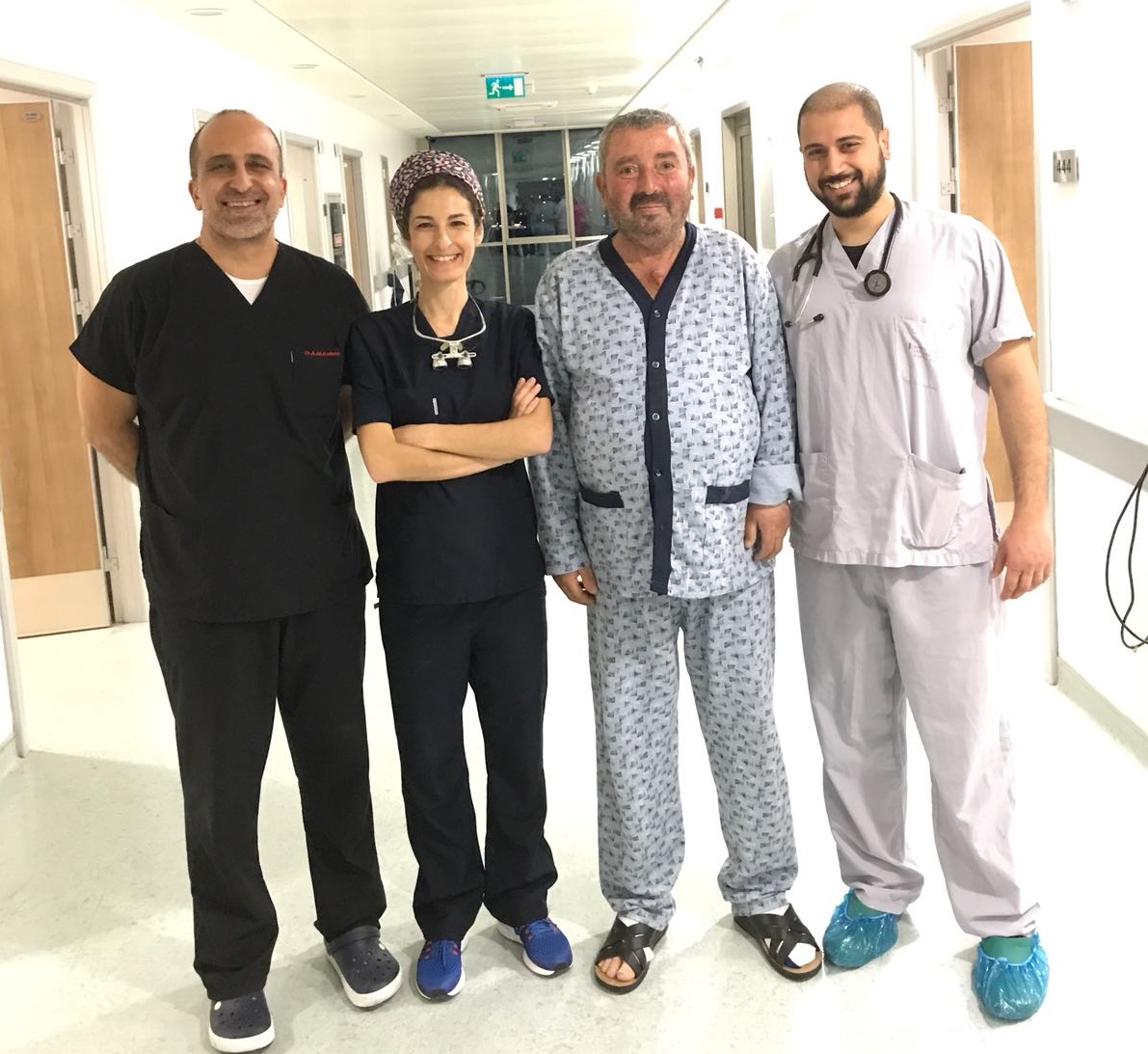
Having been diagnosed with ventricular septal rapture (a hole in the inner wall of the heart) due to a severe heart attack at the health facility that he admitted a while ago with a complaint of chest pain and shortness of breath, the 60 year old patient Mustafa Fatih Koçin was referred to the Near East University Hospital Emergency Service for further examination and treatment.
The patient, who had 70-80 % vital risk due to the most severe form of heart attack, was immediately taken under an operation. Following an 8 hour lasting successful operation, the patient was monitored in the intensive care unit for four days, and discharged after the treatment and care process in the inpatient service of the cardiovascular surgery section.
Near East University Hospital cardiovascular surgeons are on the leading edge of treating cardiovascular and cardiothoracic conditions using the latest innovations and techniques in heart surgery. Cardiovascular surgeons at Near East University Hospital are part of an integrated, multidisciplinary team of physicians and health care professionals who provide individualized care for each patient. They are well equipped and committed to providing expert, whole-person care to patients suffering from heart problems.
Treatment at Centers with High Surgical Experience Increases the Chance for Patients with Severe Heart Attack to Survive
Having been referred to Near East University Emergency Service, the patient was immediately taken to cardiovascular surgery intensive care unit by cardiovascular surgery team. A temporary heart support pump was administrated to the patient to support heart’s own pump function and accurate medication initiated to maintain vital functions at normal levels. After performing further tests, the patient was diagnosed with a perforation on the inner wall of the heart and swelling on the left side due to severe heart attack. Since this disorder required a surgical intervention, the patient was prepared rapidly for a surgery.
Under the helm of the Head of the Department of Cardiovascilar Surgery of Near East University Hospital, Prof. Dr. Aşkın Ali Korkmaz, a team consisting of cardiovascular surgeons Assoc. Prof. Dr. Barçın Özcem, Asst. Prof. Dr. Özlem Balcıoğlu, anesthetist Dr. Filiz Bayır and cardiologist Assoc. Prof. Dr. İlker Gül as well as surgical nurses performed an open heart surgery and all reconstruction was completed successfully.
In Such Severe Cases, the Intensive Care Process Has as High Risk as the Surgical Process.
Delivering information about the surgical procedure, the cardiovascular surgery team stated that they performed a very high risk surgery. It was stated that the surgical procedure lasted 8 hours and the hole in the ventricular septum was closed by sewing a synthetic patch with a special patching technique, the ballooning on the left side was repaired and two blocked coronary arteries was replaced successfully via bypass surgery.
Following the operation, the patient was taken to the intensive care unit for close and intense care since the intensive care process was as risky as the surgical operation. In order to avoid postsurgical complications, the follow-up and treatment of the patient was carried out by expert doctors and nurses who are highly experienced in cardiovascular post-surgery intensive care. As the patient experienced no complications throughout four days in intensive care unit, he was taken to the cardiovascular surgery inpatient service for normal medical care. The patient’s cardiac functions identified to be normal on echocardiographs and he was discharged provided that he would come for control after a week.
Does a Hole Develop in Heart After a Heart Attack?
Myocardial infarction (MI), publicly known as a “heart attack”, is a consequence of atherosclerosis (coronary artery disease) and is a life-threatening health problem. Patients having a heart attack may rarely experience perforations in the inner wall of the heart. This is the most severe form of heart attack and the vital risk is about 70-80%. When such a complication is encountered, the patient should be urgently referred to centers with high surgical experience on cardiovascular disorders.
Patients with Post-infraction Ventricular Septal Rapture Should Receive Heart Supportive Treatment till Surgical Intervention
Ventricular septal rupture (hole in the heart due to heart attack)) is a rare but devastating complication after myocardial infarction and it has high mortality rate. Post-infarction VSR is recognized as a surgical emergency, and the presence of cardiogenic shock is an indication for intervention. It is imperative that such patients should be followed up in the intensive care unit and receive heart supportive care until the time of operation. While the vital risk for patients, who undergo planned bypass surgery, remains 1% to 3%, the vital risk for those with hole in the heart (VSR) is 50% to 60%. Accurate and early diagnosis, timing of the surgery, definitive surgery, the experience of the surgical team as well as the infrastructure of the hospital are the key factors affecting the success of the surgical intervention.
Equipped with high-end devices that are product of the latest medical technology, Near East University Hospital with its highly experienced and specialized cardiovascular surgery team is on the leading edge of treating cardiovascular conditions by using the innovations and the newest techniques in cardiovascular surgery.